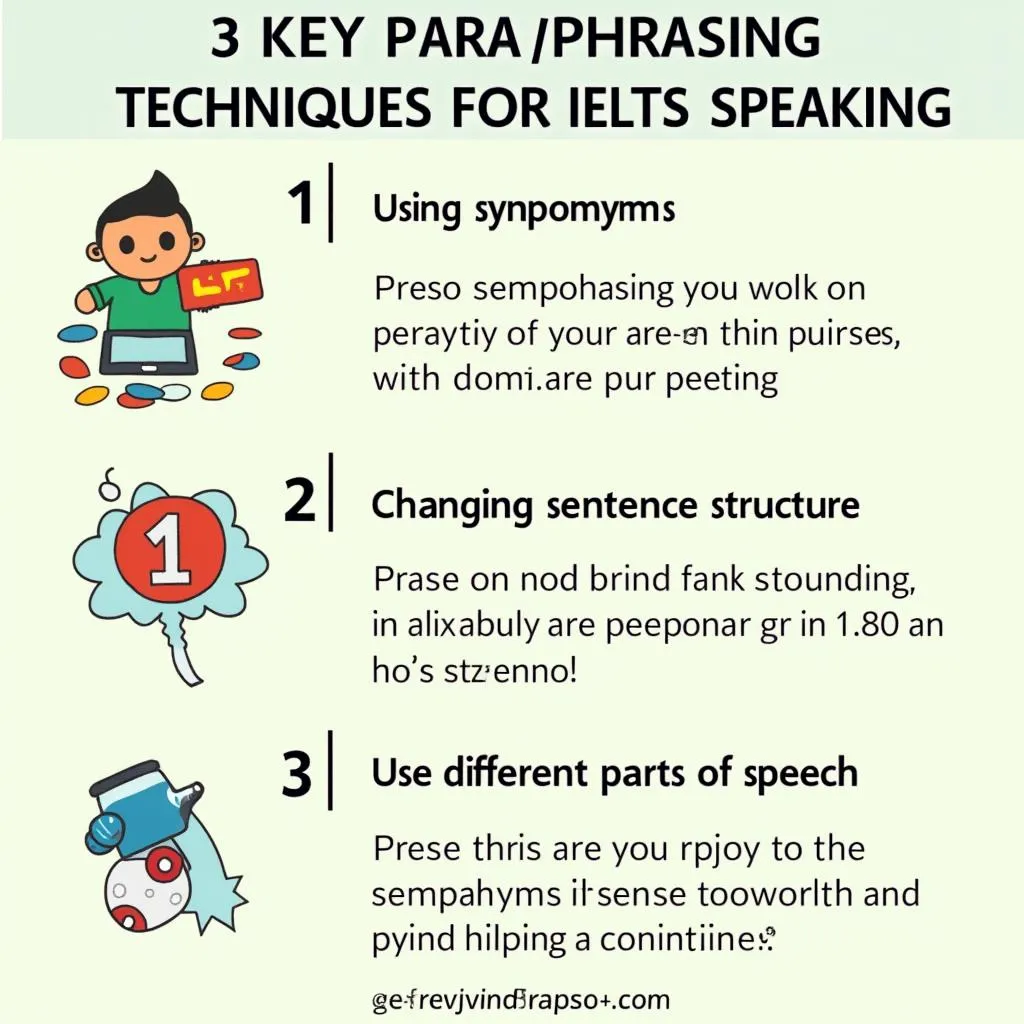Understanding the Importance of Paraphrasing in IELTS Speaking
Paraphrasing is a crucial skill for IELTS Speaking candidates. It involves restating information or ideas using different words while maintaining the original meaning. Effective paraphrasing demonstrates your language proficiency, vocabulary range, and ability to express complex ideas clearly. It’s particularly valuable when you need to clarify a point, expand on an idea, or avoid repetition during your IELTS Speaking test.
Key Benefits of Paraphrasing in IELTS Speaking
- Showcases your vocabulary range
- Demonstrates your ability to express ideas flexibly
- Helps you avoid repeating the same words or phrases
- Allows you to clarify complex concepts
- Improves your overall fluency and coherence
Techniques for Effective Paraphrasing
1. Use Synonyms and Alternative Phrases
One of the most straightforward ways to paraphrase is by replacing words with their synonyms or alternative phrases. This technique helps you demonstrate your vocabulary range while maintaining the original meaning.
Example:
Original: “The city has experienced rapid growth in recent years.”
Paraphrase: “The urban area has undergone swift expansion lately.”
2. Change the Sentence Structure
Altering the sentence structure is another effective paraphrasing technique. You can rearrange the order of ideas or change active voice to passive voice (or vice versa).
Example:
Original: “Many people believe that technology has improved our lives.”
Paraphrase: “It is widely believed that our lives have been enhanced by technological advancements.”
3. Use Different Parts of Speech
Transform nouns into verbs, adjectives into adverbs, or vice versa. This technique can help you restructure sentences while preserving their meaning.
Example:
Original: “The government’s decision led to widespread protests.”
Paraphrase: “The governmental choice resulted in people protesting extensively.”

4. Simplify or Elaborate
Depending on the context, you can either simplify complex ideas or elaborate on simpler ones. This technique is particularly useful when you need to explain a concept more clearly or provide additional details.
Example:
Original: “The intricate ecosystem of the rainforest is vital for global biodiversity.”
Paraphrase (Simplified): “The complex way plants and animals live together in rainforests is very important for keeping different species alive all over the world.”
5. Use Examples or Analogies
Introducing examples or analogies can be an effective way to paraphrase and clarify your ideas. This technique is especially useful when discussing abstract concepts.
Example:
Original: “Social media has revolutionized communication.”
Paraphrase with analogy: “Social media has changed the way we communicate, similar to how the telephone transformed long-distance conversations in the past century.”
Common Pitfalls to Avoid When Paraphrasing
1. Changing the Original Meaning
While paraphrasing, it’s crucial to maintain the original meaning of the statement. Avoid introducing new ideas or altering the intended message.
2. Using Inappropriate Synonyms
Be cautious when selecting synonyms. Some words may have similar meanings but different connotations or levels of formality.
3. Over-relying on a Single Technique
Don’t limit yourself to just one paraphrasing technique. Combine different methods to demonstrate your language flexibility.
4. Paraphrasing Without Understanding
Ensure you fully understand the original statement before attempting to paraphrase it. Misunderstanding can lead to inaccurate or irrelevant responses.
Practicing Paraphrasing for IELTS Speaking
1. Read Widely and Actively
Expose yourself to various writing styles and topics. As you read, practice mentally restating the main ideas in your own words.
2. Use Paraphrasing Tools Wisely
Online paraphrasing tools can be helpful for practice, but don’t rely on them exclusively. Use them to generate ideas and then refine the paraphrases yourself.
3. Record and Analyze Your Speech
Practice paraphrasing aloud and record yourself. Listen to the recordings to identify areas for improvement in your fluency and coherence.
4. Engage in Conversation Practice
Participate in English conversation groups or find a language exchange partner. Practice paraphrasing during real conversations to improve your spontaneity.
5. Create a Personal Synonym Bank
Keep a list of commonly used words and their synonyms. Regularly review and expand this list to enhance your vocabulary for paraphrasing.
Applying Paraphrasing in IELTS Speaking Tasks
Part 1: Short Questions and Answers
In this section, use simple paraphrasing techniques to avoid repeating the exact words from the question in your answer.
Example:
Question: “Do you like reading books?”
Paraphrased Answer: “Yes, I’m quite passionate about literature. I find immersing myself in various types of written works to be both enjoyable and enlightening.”
Part 2: Long Turn
When given a topic card, paraphrase key points to structure your response. This demonstrates your ability to process and reformulate information.
Example:
Topic: Describe a place you like to relax.
Paraphrased Introduction: “I’d like to talk about a location where I find peace and tranquility, a spot that allows me to unwind and recharge.”
Part 3: Discussion
In this more challenging section, use advanced paraphrasing techniques to express complex ideas and engage in a sophisticated discussion.
Example:
Question: “How has technology changed the way people work?”
Paraphrased Response: “Technological advancements have significantly transformed the nature of employment. The digital revolution has reshaped workplace dynamics, enabling remote collaboration and increasing productivity through automated processes.”
Conclusion
Mastering the art of paraphrasing is essential for success in the IELTS Speaking test. By employing various techniques such as using synonyms, altering sentence structures, and changing parts of speech, you can effectively demonstrate your language proficiency and adaptability. Remember to practice regularly, avoid common pitfalls, and apply paraphrasing strategically across all parts of the Speaking test. With consistent effort and mindful application, you’ll be well-equipped to showcase your English language skills and achieve your desired IELTS score.